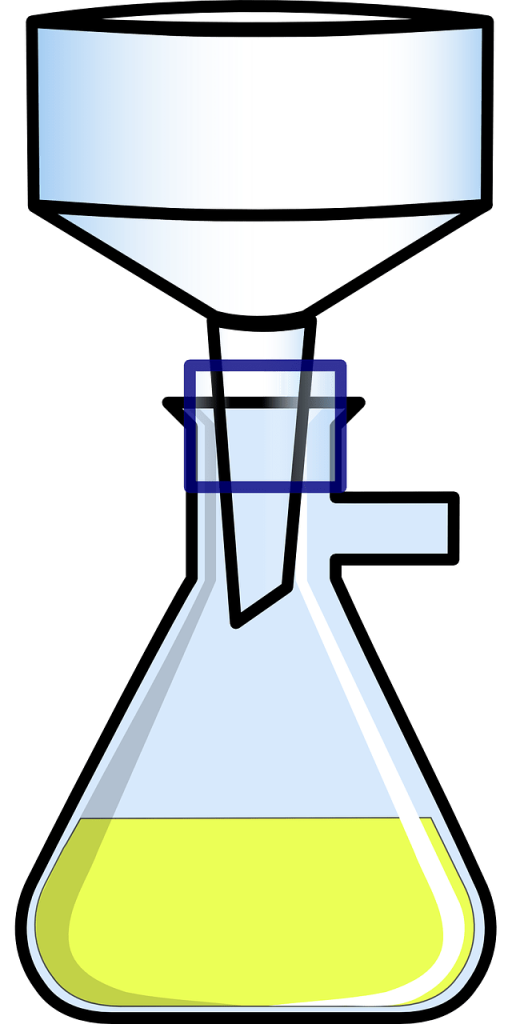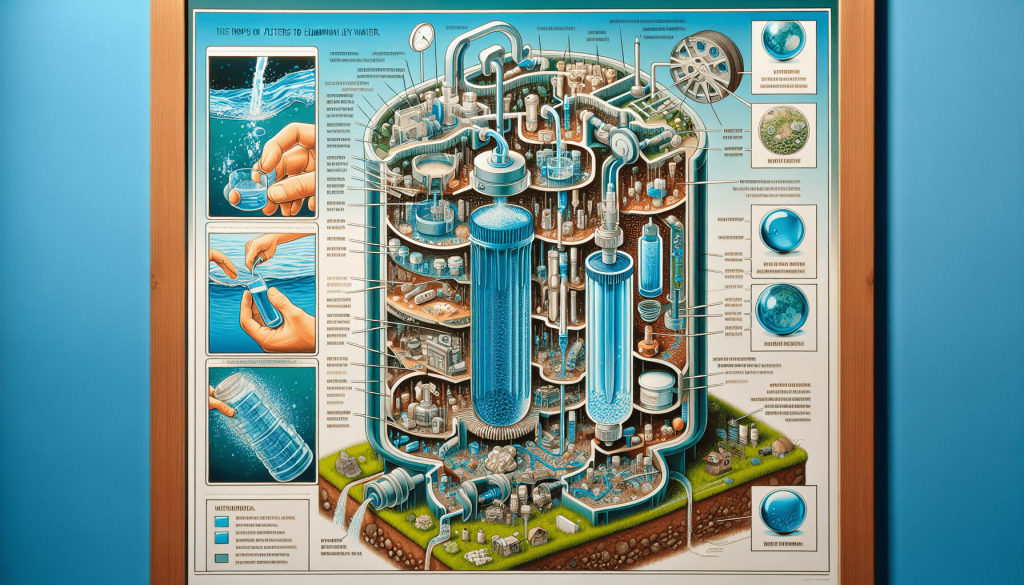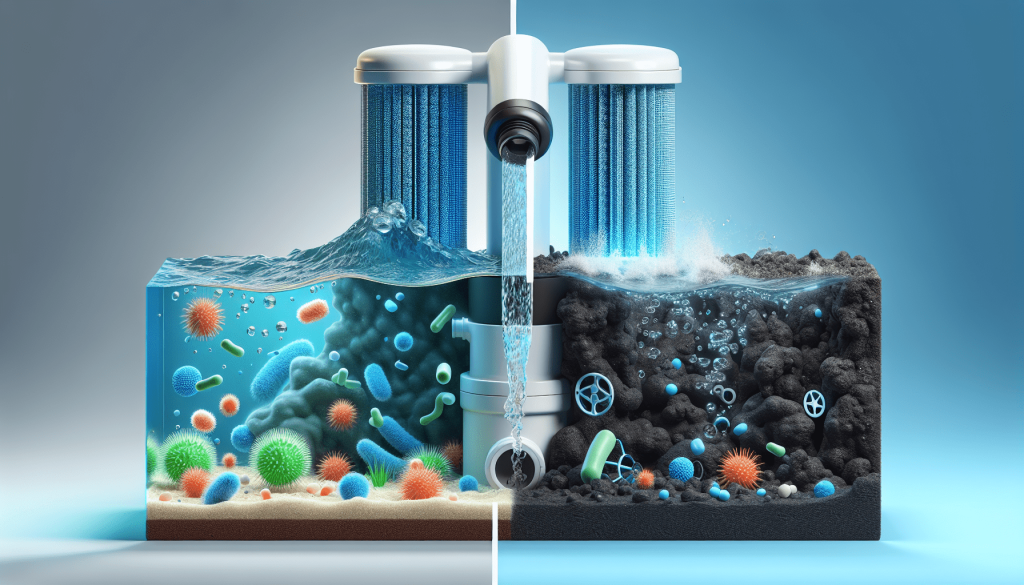Do you ever wonder if the water you’re drinking is truly clean and safe? We all know that our tap water goes through a filtration process, but do water filters really purify your water? In this article, we will explore the effectiveness of water filters in removing contaminants and providing you with clean, great-tasting water. Discover the science behind water filtration and find out if investing in a water filter is truly worth it for your health and peace of mind.
Types of water filters
Carbon filters
Carbon filters are one of the most common types of water filters available on the market. They use activated carbon to remove impurities from water. Activated carbon is highly porous and has a large surface area, allowing it to effectively adsorb and trap contaminants. This type of filter is particularly effective at removing chlorine, volatile organic compounds (VOCs), and unpleasant odors and tastes from water.
Reverse osmosis filters
Reverse osmosis filters employ a different method for water purification. They use a semi-permeable membrane to separate impurities from water. The membrane allows water molecules to pass through while trapping larger particles and molecules. This results in the removal of a wide range of contaminants, including bacteria, viruses, heavy metals, and dissolved solids.
Ceramic filters
Ceramic filters are another popular choice for water filtration. These filters consist of a porous ceramic material that effectively removes larger particles, sediment, and microorganisms from water. Ceramic filters are known for their longevity and durability, making them an excellent choice for long-term use.
UV filters
UV filters utilize ultraviolet light to disinfect water. The UV light damages the genetic material of microorganisms, rendering them unable to replicate and causing their death. This method is particularly effective against bacteria, viruses, and other pathogens. While UV filters do not remove other types of contaminants, they can be used in combination with other filters for comprehensive purification.
How do water filters work?
Mechanical filtration
Mechanical filtration is the process of physically removing suspended particles and impurities from water. This is typically achieved through the use of a barrier or sieve, such as a mesh or fine fibers, that traps larger contaminants. Mechanical filtration is effective at removing sediment, sand, rust, and other visible particles.
Adsorption
Adsorption is a process in which contaminants adhere to the surface of adsorbent materials, such as activated carbon. The porous structure of the adsorbent material provides a large surface area, allowing it to attract and trap impurities. Adsorption is particularly effective at removing organic compounds, chlorine, and some heavy metals.
Ion exchange
Ion exchange involves the exchange of ions between water and a resin bed within the filter. This process removes dissolved solids and replaces them with more desirable ions, such as sodium or potassium. Ion exchange filters are especially effective at reducing the levels of minerals, such as calcium and magnesium, which can cause hardness in water.
Chemical reaction
Some water filters utilize chemical reactions to purify water. For example, activated alumina filters remove fluoride through a chemical process called adsorption. The activated alumina reacts with fluoride ions, binding them to its surface and removing them from the water.

What contaminants do water filters remove?
Microorganisms
Water filters are highly effective at removing various microorganisms, including bacteria, viruses, and protozoa. Filters with small pore sizes or those incorporating technologies like ceramic and reverse osmosis are particularly adept at eliminating these harmful pathogens.
Chemicals
Water filters can remove a wide range of chemicals found in drinking water. This includes common contaminants like chlorine, pesticides, herbicides, pharmaceuticals, and volatile organic compounds (VOCs). It’s important to choose a filter that is specifically designed to target the chemicals of concern.
Heavy metals
Many water filters can effectively reduce the levels of heavy metals, such as lead, mercury, arsenic, and cadmium, in drinking water. Filters that use activated carbon, reverse osmosis, or ion exchange processes are commonly used for heavy metal removal.
Sediments
Sediments, such as sand, silt, and rust, can be removed through mechanical filtration. Filters with small pore sizes or those incorporating sediment cartridges are designed to effectively trap and remove these particles.
Chlorine
Chlorine is commonly used as a disinfectant in municipal water treatment. Water filters with activated carbon, like carbon filters and reverse osmosis filters, can effectively remove chlorine, improving the taste and smell of the water.
Volatile organic compounds (VOCs)
Volatile organic compounds (VOCs) are chemicals that can easily vaporize and contaminate air and water. Many water filters, especially those with activated carbon, are designed to remove VOCs, including harmful contaminants like benzene and trichloroethylene.
Effectiveness of water filters
Reduction vs. elimination
It’s important to understand that water filters can significantly reduce the levels of contaminants present in water, but they might not eliminate them entirely. The effectiveness of a filter depends on factors such as the filter type, pore size, and the specific contaminants it targets. It’s always recommended to check the product literature or consult with the manufacturer to understand the filter’s effectiveness in reducing specific contaminants.
Filter lifespan
The lifespan of a water filter refers to how long it can effectively remove contaminants before it needs to be replaced. The lifespan can vary depending on factors like filter type, quality, and usage. It’s essential to monitor and replace filters regularly to ensure optimal performance and maintain the purity of the filtered water.
Filter pore size
The size of a filter’s pores determines what contaminants it can effectively remove. Filters with smaller pore sizes can capture smaller particles, including microorganisms and sediment. Choose a filter with a pore size that aligns with the specific contaminants you are concerned about.
Flow rate
The flow rate of a water filter refers to how quickly water passes through the filter. While a higher flow rate is generally desirable for convenience, it’s important to strike a balance between flow rate and filtration effectiveness. Some filters might have slower flow rates to ensure thorough purification.
Certifications and standards
When selecting a water filter, look for certifications and standards from reputable organizations. Third-party certifications, such as NSF International, demonstrate that the filter has been tested and verified to effectively remove specific contaminants. These certifications provide confidence in the filter’s performance and reliability.

Limitations of water filters
Does not remove all contaminants
While water filters can effectively remove a wide range of contaminants, it’s important to note that they might not remove all types of impurities. Some contaminants, such as volatile organic compounds (VOCs), may require specialized filters or additional treatment methods for complete removal. It’s crucial to understand the limitations of your chosen filter and its effectiveness against specific contaminants.
May not be effective against certain contaminants
Some contaminants, such as certain bacteria or viruses, may require additional treatment methods beyond standard water filters. UV filters are highly effective against many microorganisms, but it’s essential to ensure that the filter is designed to handle specific pathogens if you require this level of purification.
Maintenance and replacement requirements
Water filters require regular maintenance and periodic replacement to ensure optimal performance. Regular cleaning or replacement of filter cartridges, membrane cleaning for reverse osmosis systems, and sanitization of UV filters are necessary tasks to maintain the effectiveness of the filter. Failure to perform proper maintenance can lead to reduced filtration capabilities and potential contamination of the filtered water.
Initial cost and ongoing expenses
Water filters vary in terms of initial cost and ongoing expenses. Some filters, like carbon filters and ceramic filters, have lower upfront costs but require more frequent replacement of filter cartridges. Reverse osmosis systems, on the other hand, have a higher initial cost but generally have lower ongoing expenses. Consider your budget and long-term costs when choosing a water filter.
Benefits of using water filters
Improved taste and odor
One of the immediate benefits of using a water filter is the improved taste and odor of the filtered water. Filters remove chlorine, sediment, and other impurities that can affect the flavor and smell of tap water, resulting in a fresher and more enjoyable drinking experience.
Reduced exposure to harmful substances
Water filters provide a valuable defense against various harmful substances that may be present in tap water. By removing contaminants like lead, bacteria, pesticides, and other chemicals, filters help reduce the potential health risks associated with these substances. This is particularly important for individuals with compromised immune systems, pregnant women, and young children who may be more susceptible to the adverse effects of contaminants.
Environmental benefits
Utilizing a water filter can contribute to reducing plastic waste generated by the consumption of bottled water. By filtering and purifying your tap water, you can reduce the reliance on single-use plastic water bottles, which often end up in landfills or contribute to pollution in our oceans and waterways. Choosing a reusable water bottle and filtering your own water is a simple step towards a more sustainable lifestyle.
Convenience
Having a water filter at home provides the convenience of accessing clean and purified water directly from your tap. This eliminates the need to purchase bottled water, saving you time and money. Additionally, you can enjoy the peace of mind that comes with knowing that your drinking water is safe and free from potentially harmful contaminants.

Factors to consider when choosing a water filter
Contaminant removal capabilities
One of the most important considerations when choosing a water filter is its ability to remove specific contaminants of concern. Assess the quality of your water and identify the primary contaminants you want to target. Choose a filter that is designed to effectively remove those contaminants. The product’s packaging or manufacturer’s website should provide information about the filter’s contaminant removal capabilities.
Filter type and technology
Different filter types employ various technologies to purify water. Consider the advantages and disadvantages of each type, as well as how well they align with your specific needs. Carbon filters are effective at removing chemicals, while reverse osmosis filters provide comprehensive filtration. Ceramic filters are durable and focus on removing microorganisms, while UV filters ensure effective disinfection.
Filter lifespan and replacement cost
Evaluate the lifespan of the filter and the associated replacement cost. Some filters may require frequent replacement, which can add up in terms of expense. Consider the durability and cost-effectiveness of the replacement cartridges or membranes to ensure that the filter remains a long-term solution for your water purification needs.
Flow rate
Consider the flow rate of the filter and how it aligns with your usage requirements. If you have a large household or high water usage, you may need a filter with a higher flow rate to meet your needs. However, it’s important to find a balance between flow rate and filtration capabilities to ensure optimal purification.
Installation requirements
Take into account the installation requirements of the water filter. Some filters may need professional installation, while others can be easily installed by homeowners. Consider the space available under your sink or on your countertop, as well as any necessary plumbing modifications or connections.
Budget
Your budget is an essential factor to consider when choosing a water filter. Consider both the initial cost of the filter and any ongoing expenses associated with maintenance and replacement. It’s important to find a filter that meets your needs without putting a strain on your finances.
Additional considerations
Source water quality
The quality of your source water can impact the effectiveness and required filtration capabilities of your water filter. Assessing the contaminants, such as sediment, minerals, or chemicals, present in your tap water can help determine the appropriate type of filter and technology needed for purification.
Water usage and specific needs
Consider your household’s water usage and specific needs. If you consume a large amount of drinking water, prioritize a filter with a higher flow rate and larger capacity. If you have specific concerns, such as allergies or sensitivities, you may want to choose a filter that focuses on removing specific contaminants or impurities.
Available space
Consider the available space in your home for installing a water filter. Under-sink filters require adequate space beneath the sink, while countertop filters need space on the countertop. Ensure that the chosen filter can be easily accommodated into your living environment without causing any inconvenience or obstruction.

Common misconceptions about water filters
Water filters can make any water source safe
While water filters are capable of removing many contaminants, it’s important to note that they have limitations. Filters may not be able to eliminate all types of impurities, such as certain bacteria or viruses. It’s important to assess the quality of your water source and consult with experts or the manufacturer to determine the appropriate filtration methods for your specific needs.
Boiling water is enough to remove contaminants
Boiling water is an effective method for killing many types of microorganisms, such as bacteria or viruses. However, boiling does not remove other types of impurities like chemicals, heavy metals, or sediment. Water filters provide comprehensive purification that addresses a wide range of contaminants beyond what boiling alone can achieve.
All water filters are the same
Water filters vary in terms of filtration capabilities, technology, and effectiveness. Not all filters are designed to remove the same contaminants, and their performance can differ significantly. It’s important to select a filter that aligns with your specific needs and requirements.
Conclusion
Water filters play a critical role in purifying water and ensuring its safety for consumption. The effectiveness of a water filter depends on various factors, including the type of filter, its contaminant removal capabilities, and maintenance requirements. When choosing a water filter, consider factors such as filtration technology, filter lifespan, flow rate, installation requirements, and budget. It’s important to assess the quality of your water source, understand the contaminants present, and select a filter that is specifically designed to address your concerns. By investing in a high-quality water filter, you can enjoy the benefits of improved taste, reduced exposure to harmful substances, and environmental sustainability. Remember to regularly maintain and replace your filter to ensure continued purification and peace of mind.



